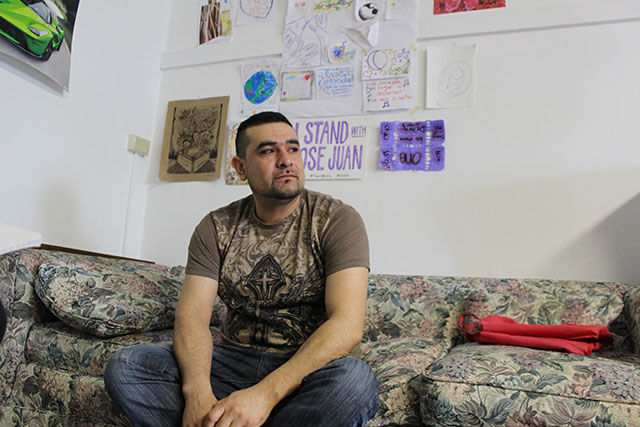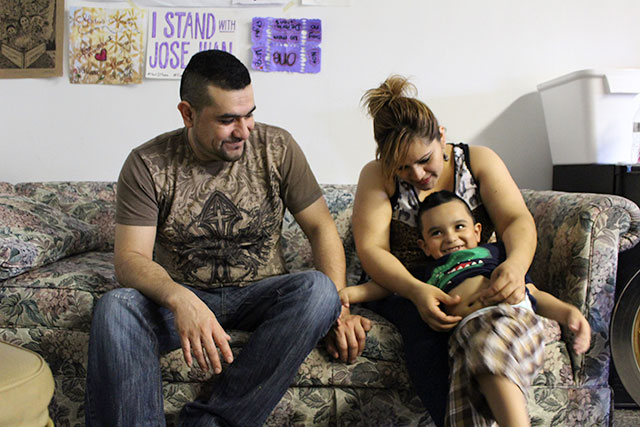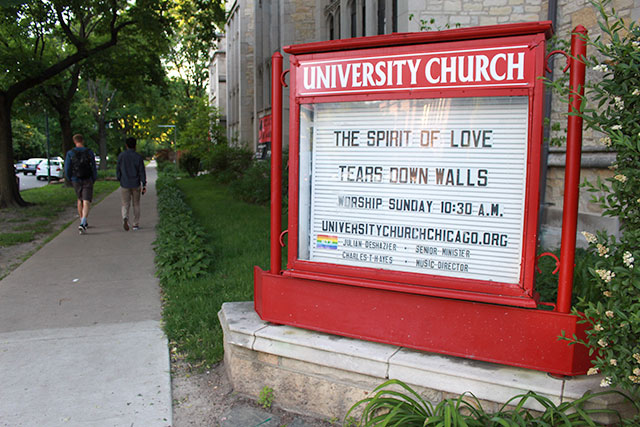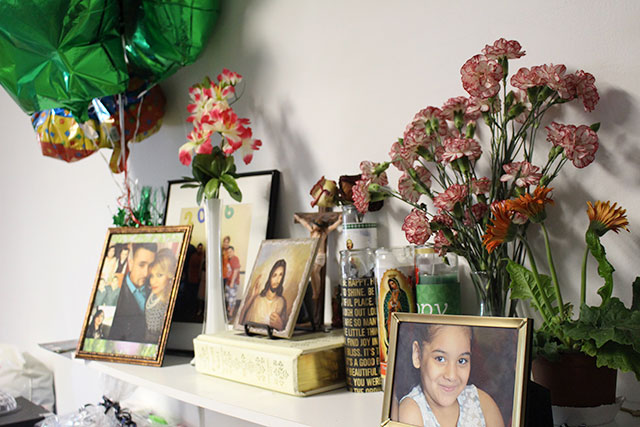
For the last six months, Jose Juan Moreno has been confined to a small room above the University Church on Chicago’s South Side. Safe inside, he cannot venture more than 50 steps from the corner where he sleeps. If he goes beyond that, US authorities have promised to deport him from the country.
Although he has lived 17 years in Chicago — the only home any of his five American-born children have ever known — Moreno originally crossed the border from Mexico without papers. Under US law, that means he is subject to arrest and deportation at any time, a status he shares with 11 million people in the United States considered “undocumented.”
Earlier this year, Moreno received a deportation order from Immigration and Customs Enforcement (ICE), the authority that carries out the raids and arrests that represent the strong arm of national immigration policy. He was told to leave by April 15, otherwise he’d be deported.
In response, Moreno did the only thing he could think of — he sought sanctuary in the church, praying that even if the authorities would not respect his family or his long years of work in the US, at least they might respect the sanctity of a holy place.
So far, they have. But for how much longer is anybody’s guess.
“I came to this country for the same reason everyone does, to work for a better future for my family,” Moreno told Truthout. “We didn’t have opportunities to do so back in Mexico,” he explained, noting that he came in order to support the mother and siblings he left behind in the state of Zacatecas.
Moreno’s case underscores the uncertainty that continues to face undocumented people across the country today, many of whom live in the shadows, despite promises by President Obama that he would work to improve conditions.
Instead, Obama will go down in history as the US president under whom the highest number of deportations has occurred — more than under all of the presidents in the century before him, combined.
 Jose Juan Moreno, his wife, and one of his sons sit together in the room at the University Church on Chicago’s Southside where Moreno has sought sanctuary from ICE since April. (Photo: Hoda Katebi)
Jose Juan Moreno, his wife, and one of his sons sit together in the room at the University Church on Chicago’s Southside where Moreno has sought sanctuary from ICE since April. (Photo: Hoda Katebi)
“ICE Is a Rogue Agency”
At this year’s Democratic National Convention (DNC), an 11-year-old, speaking of her fear that her undocumented mother would be deported, received a standing ovation, and Hillary Clinton called “comprehensive immigration reform” the “right thing to do.” At the same time, however, the DNC hired a few undocumented immigrants to work on the campaign, but refused to pay them.
Despite the emotional speeches, specifics were hard to come by. And with all the Democrats’ posturing as the “pro-immigrant” party, the casual viewer could be forgiven for not realizing that under Obama’s watch, immigration policy has only grown harsher and harsher.
Indeed, while media attention has focused on the fear that a presidential victory by Republican candidate Donald Trump could almost certainly have grave consequences for the lives of the undocumented, during Obama’s eight years in office, more than 2 million people have already been deported.
This includes more than 400,000 every year between 2012 and 2014. Numbers have since fallen, but the rate is still higher than ever before.
Tania Unzueta, an anti-deportation organizer in Chicago, told Truthout that the scariest thing facing the movement is not the possibility (albeit small) of a Trump victory, but the reality of a terrifyingly violent present.
Unzueta argued that under Obama, mass deportation has become “normalized,” giving a façade of legality to the process and convincing the public that it is possible to “deport people humanely.”
“The Obama administration has built the structures for Trump. All of the programs that Obama has put in place — the Priority Enforcement Program, the ways immigration enforcement can enter people’s homes, the raids — that infrastructure will be passed on to the next president,” she said.
This is not how things were supposed to turn out. Obama received strong Latino support in both the 2008 and 2012 elections, in large part because he promised to work for immigration reform.
Both Democrats and Republicans agreed that reform needed to happen, but internal disagreements among Republicans and opposition to Obama prevented a breakthrough. While some figures have called for mass deportation of all undocumented people, polls show that an overwhelming majority of Americans favor some kind of legalization and amnesty, a fact recognized by both parties.
Democratic contender Hillary Clinton has said she will open up a path to legalization for undocumented immigrants within her first 100 days in office. But her promises sound eerily familiar to those made by Obama in the last two rounds of elections, and it is unclear how she would succeed where he could not.
Bill Hing, a University of San Francisco law professor, traces Obama’s failure to implement a more humane immigration policy to two main causes: Republican obstinacy and the fact that stopping immigration is increasingly being seen as a part of the “war on terror.”
Early on in his presidency, Obama tried to convince Republicans that immigration reform would not mean complete amnesty. To do so, he began ramping up immigration enforcement, particularly through so-called “silent raids.”
Unlike raids under the Bush administration, during which ICE showed up at workplaces with guns blazing, the silent raids involved behind-the-scenes threats to employers that ICE would check Social Security Numbers of employees, prompting them to fire undocumented workers en masse. In terms of public relations, the raids were a success for Obama. But in terms of strategy, not so much.
Partially as a result of the rise of the anti-immigrant Tea Party movement, Republicans sympathetic to reform were unable to convince their party to meet Obama halfway. As a result, ramped-up enforcement by the administration failed to yield any dividends.
Behind the scenes, meanwhile, larger forces were at play. In the wake of 9/11, immigration police had become subsumed under the Department of Homeland Security (DHS).
“It changed the mindset of ICE employees,” Hing said. “They became more emboldened, thinking that not only were they protecting the border, they were now fighting against terrorism.”
Although the process began under Bush, it expanded and deepened under Obama. One example was the Secure Communities program, which enabled local law enforcement to fingerprint detainees and share that information with the FBI, the DHS and ICE.
“This resulted in the deportation of thousands of people every year, many of whom were not dangerous criminals but were stopped because of minor traffic offenses,” Hing said.
Among those deported, for example, were many undocumented women who were victims of domestic violence. When police arrived on the scene, they fingerprinted all parties involved, and since these fingerprints were shared with ICE, the victims became fair game for deportation.
Although Secure Communities was discontinued in 2014, it was replaced by the Priority Enforcement Program (PEP). Critics say that the new program — nicknamed “felons, not families” — continues many of the worst aspects of Secure Communities without addressing its faults. Furthermore, it has promoted the idea that the deportations are primarily targeting criminals, even though a recent investigation found around half of the “holds” placed by the program are on people with no criminal records.
Olga Tomchin, the Deportation Defense Coordinator at the National Day Laborer Organizing Network, said in an interview that the strategy groups undocumented people into “good immigrants” and “bad immigrants” and renders the lives of the latter “disposable.”
“The policy acts as if having a felony conviction renders you outside of having a family and a community and being valued as a human being,” she said. “Even though there is a growing movement across the country to end mass incarceration and to reintegrate those leaving prison into society, none of this applies to non-citizens. They don’t get any second chances.”
“There is a cognitive dissonance manifested in a totally unforgiving attitude toward mistakes and a failure to understand racial profiling and how unfair the system is to people of color to begin with,” she added.
Around 5 million children in the United States today are estimated to have a parent currently in jail, and half of the children have a parent with a criminal record. Clearly, “felons” do have families.
Moreno is a case in point. He was charged with an aggravated DUI in 2009 for driving under the influence of alcohol. Because he had no license — undocumented people were forbidden from acquiring one where he lived — the charge was even more serious.
He paid the fine and served three months in prison. But on the day he walked free, ICE arrived at the prison gate and detained him. They didn’t charge him with anything, but after an initial interrogation, he had to attend monthly meetings for the following seven years.
Despite maintaining a record of good behavior since, the policy considers him a “felon,” liable to deportation at any time, regardless of the fact that he has spent the last two decades making a family here.
Tomchin said that his case was far from unique, noting that DUI charges were extremely common among those she was supporting. “It’s frustrating, because if you’re a citizen, you’ll get a fine, probation, and maybe you’ll lose your license. But if you’re not a citizen, a DUI can mean being sent to your death [through deportation to a violent home country] or being locked up for years and years.”
 A sign outside the University Church in the Hyde Park neighborhood of Chicago’s Southside, where Jose Juan Moreno has been in “sanctuary” since April. (Photo: Hoda Katebi)
A sign outside the University Church in the Hyde Park neighborhood of Chicago’s Southside, where Jose Juan Moreno has been in “sanctuary” since April. (Photo: Hoda Katebi)
“The Only Secure Community Is an Organized One”
Despite the “felons, not families” reform, other aspects of immigration policy explicitly target those the government admits are not criminals. In January, for example, authorities launched an arrest campaign called “Operation Border Guardian,” which explicitly targets women and children who arrived from Central America seeking asylum but whose cases have been rejected.
Hundreds have been deported, even as reports are flowing back that a number of deportees to these same countries have been murdered after arrival.
Since 2014, tens of thousands have crossed into the US fleeing spiraling rates of violence in countries like El Salvador, Guatemala and Honduras, many seeking asylum. Gang violence has led to a morbid competition for “murder capital of the world,” and thousands of children have fled unaccompanied to the United States in order to avoid being press-ganged to work as child soldiers for the cartels and other forms of violent extortion.
Critics note that the violence in these countries is itself a direct result of US deportations in the 1990s. Thousands of gang members who were arrested in the US were deported back to Central America, bringing big-city US gun violence and destabilizing countries barely recovering from years of civil war. It was those civil wars of the 1980s — in which the US funded and armed right-wing dictatorships linked to death squads — that were the original reason for their families’ migration to begin with.
The case of Francisco Aguirre, an undocumented immigrant rights activist that Tomchin is supporting, highlights the horrifying human toll of US policy. A father of three, Aguirre came from El Salvador two decades ago, but was served with a deportation order in 2014 for reentering the country illegally after a previous deportation 15 years before. In response, he sought sanctuary in an Oregon church.
In 2013, his son Moises fled gang violence in their home country in the hopes of joining his father. He arrived in the US unaccompanied and was arrested and detained by border police. He was eventually released, but traumatized by his detention and terrified of being detained again, Moises begged to go back to El Salvador. A few months after returning, he was murdered.
Aguirre’s deportation order, meanwhile, was dropped earlier this year. Just weeks after his victory, however, renewed deportation orders were issued, and as a result, Aguirre has begun his fight anew.
“ICE is a rogue agency, and they don’t even follow their own rules or the law as it is,” Tomchin said. “Getting a victory on paper is not the solution because they’re going keep doing what they want.”
“The only source of optimism I have is that people are increasingly willing to fight back and go public,” Tomchin said. “Those are the only people who stand a chance of success. Right now, the only secure community is an organized one.”
 Photographs, flowers, and religious icons decorate the table of the room at University Church where Jose Juan Moreno has been living in “sanctuary” since April. (Photo: Hoda Katebi)
Photographs, flowers, and religious icons decorate the table of the room at University Church where Jose Juan Moreno has been living in “sanctuary” since April. (Photo: Hoda Katebi)
A State of Perpetual Uncertainty
While some have argued for comprehensive immigration reform, Tomchin — who came to the US from Eastern Europe as a refugee in the 1990s — says her work focuses on moral questions, not legal ones.
She argued that under the cover of immigration reform, people were “not just being excluded from protection, but leaders were affirmatively bargaining away other people’s rights.”
But Hing, the law professor, is still confident in the possibility of a more humane immigration policy. “Americans need to have a better understanding of why these people are here, and why they are leaving their home countries,” he said.
He noted that, in addition to fleeing gang and drug violence, many people — particularly from Mexico — were fleeing situations of economic deprivation directly linked to US policies.
The 1994 North American Free Trade Agreement (NAFTA) was a key example. After joining a united market with Canada and the US, Mexico could not compete with a flood of cheap imports buoyed by government subsides in those countries.
As a result, Mexico lost thousands of jobs, especially in agricultural regions, spurring mass migration.
Zacatecas, the state that Moreno hails from, was one of the worst hit. Once heavily dependent on agriculture, some estimate that around half of the region’s population now lives in the US. Moreno moved to the US just a few years after NAFTA’s passage, as he was unable to support his family back home.
But understanding the larger economic and political equations that got him to Chicago are little comfort for Moreno, who remains trapped in his small room above University Church.
ICE said in a statement that they consider him “an immigration fugitive,” falling within the agency’s “enforcement priorities for arrest as an at-large criminal alien.”
They would not give any details on plans to arrest Moreno, and they declined to answer queries about the moral aspects of deportation. They would only note that as a result of an internal decision, “enforcement actions do not occur at nor are focused on sensitive locations such as schools and churches,” adding, however, that “exceptions” do occur.
Stuck in limbo, Moreno and his family count each new day as a blessing. When asked about the future, Moreno speaks with hesitation and uncertainty.
“It’s not a prison, but it feels like one since I can never go outside,” he said. “I still hope that I can stay here in this country with my family, with the help of those supporting me. I hope, but I don’t know when I will find out.”
Awaiting a hold on the deportation order, Moreno and his wife and children have had to put their lives on hold. Like millions of others, he is stuck in a state of perpetual uncertainty with no end in sight.
Join us in defending the truth before it’s too late
The future of independent journalism is uncertain, and the consequences of losing it are too grave to ignore. We have hours left to raise the $12,0000 still needed to ensure Truthout remains safe, strong, and free. Every dollar raised goes directly toward the costs of producing news you can trust.
Please give what you can — because by supporting us with a tax-deductible donation, you’re not just preserving a source of news, you’re helping to safeguard what’s left of our democracy.